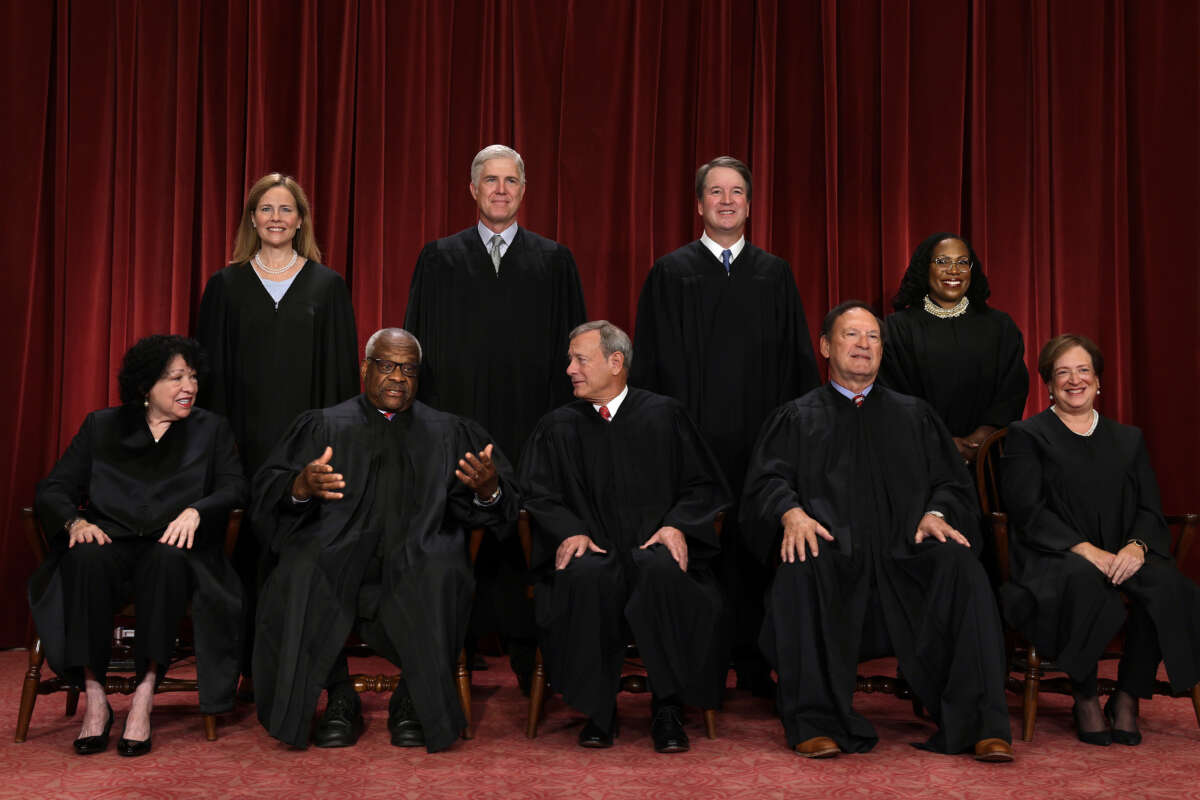Honest, paywall-free news is rare. Please support our boldly independent journalism with a donation of any size.
Millions of federal workers across the U.S. face stricter ethics requirements than those faced by Supreme Court justices, a new report finds, revealing the large insufficiencies in oversight regarding nine of the most powerful individuals in the country.
A Bloomberg analysis published this week reveals that at least 2 million U.S. federal workers, of which there are roughly 2.9 million in total, are subject to higher standards of ethics than the Supreme Court.
If a federal employee does receive a gift from a friend or relative, it needs to be approved or disclosed. Receiving gifts from others isn’t allowed for most government employees, the report said, even if the gift is worth just above $20 in value — much less the hundreds of thousands of dollars’ worth of gifts that Justice Clarence Thomas has received from conservative billionaire Harlan Crow.
In other words, even the least empowered people in the federal government, whose level of influence doesn’t come close to touching that of even a single Supreme Court justice, is subject to higher scrutiny than someone like Thomas or Chief Justice John Roberts.
Even a low-ranked, entry-level worker “in the bowels of some executive branch department is subject to stricter ethics laws and rules than the chief justice of the Supreme Court, and that’s a travesty,” Walter Shaub, senior ethics fellow at Project on Government Oversight and former head of the Office of Government Ethics, told Bloomberg. “That’s ethics standing on its head.”
Federal employees, including people like members of Congress, are all technically subject to the same law, but face different rules or punishments based on where they work. On the other hand, while the Supreme Court has a code of ethics, the code is not legally binding.
“Members of Congress can be voted out of office. Executive branch workers face oversight ethics officers,” wrote Bloomberg’s David Voreacos. “Supreme Court justices operate with no outside oversight.”
Voreacos listed a number of scenarios that are either off limits for federal employees or require prior ethics clearance, but hold no consequences for a Supreme Court justice. Accepting $200 concert tickets from a trade group or letting a lobbyist pay $125 of a fee to play on a private golf course, for instance, are no-gos for a member of Congress, a Pentagon contracting officer, a Securities and Exchange Commission lawyer, or even a federal trial judge, the publication listed.
Meanwhile, accepting an invitation to travel on a friend’s private jet for a hunting trip in the states — similar to Thomas’s trips on Harlan Crow’s jet or the late Justice Antonin Scalia’s habit of going on hunting trips paid for by private donors — is technically allowed, but needs to be approved, within certain guidelines, or must be disclosed.
Thomas, on the other hand, has openly admitted that he hasn’t disclosed the lavish gifts he’s received from Crow, and yet has not faced any punishment.
With heightened scrutiny of the financial relationships around the embattled Thomas — who has been embroiled in multiple scandals in the last few years — the release of Supreme Court justices’ annual financial disclosures on Wednesday was highly anticipated. But, unlike those of the majority of the rest of the Court, Thomas’s disclosures have not yet been released because he has asked for an extension, potentially granting him more cover for the yet-unspecified time when he does file his forms.
A terrifying moment. We appeal for your support.
In the last weeks, we have witnessed an authoritarian assault on communities in Minnesota and across the nation.
The need for truthful, grassroots reporting is urgent at this cataclysmic historical moment. Yet, Trump-aligned billionaires and other allies have taken over many legacy media outlets — the culmination of a decades-long campaign to place control of the narrative into the hands of the political right.
We refuse to let Trump’s blatant propaganda machine go unchecked. Untethered to corporate ownership or advertisers, Truthout remains fearless in our reporting and our determination to use journalism as a tool for justice.
But we need your help just to fund our basic expenses. Over 80 percent of Truthout’s funding comes from small individual donations from our community of readers, and over a third of our total budget is supported by recurring monthly donors.
Truthout has launched a fundraiser to add 432 new monthly donors in the next 7 days. Whether you can make a small monthly donation or a larger one-time gift, Truthout only works with your support.
